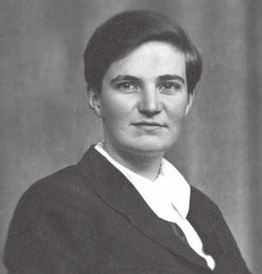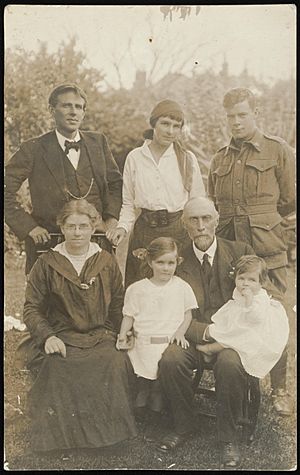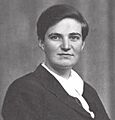Aileen Palmer facts for kids
Aileen Palmer (6 April 1915 – 21 December 1988) was an Australian poet and writer. She was also a diarist, meaning she kept detailed journals of her life. During the Spanish Civil War, she worked as an interpreter for a mobile hospital. Later, she helped in an ambulance unit in London during The Blitz, a time when bombs fell on the city during World War II.
Aileen faced many health challenges throughout her life. Her diaries are important because they show how she explored her own thoughts and feelings. She also wrote many novels and an autobiography that were never published. These writings are very valuable for people who study history, helping them understand what life was like for women and people with mental health conditions in her time.
Contents
Early Life and Education
Aileen Yvonne Palmer was born in London, England, on April 6, 1915. Her parents, Nettie Palmer and Vance Palmer, were famous writers from Australia. When Aileen was only six months old, her family moved back to Australia. They settled in the Dandenong Ranges, a beautiful area near Melbourne.
In 1917, Aileen's sister, Helen, was born. Both girls were taught at home by their mother. Later, in the 1920s, the family moved to Caloundra in South East Queensland. Aileen was a quiet child who had myopia (nearsightedness) and was left-handed.
In 1929, the family moved back to Melbourne. Aileen went to Presbyterian Ladies' College, Melbourne. She was a very good student and learned French, German, Spanish, and Russian. In 1935, she graduated from the University of Melbourne with top honors in French language and literature.
Around 1931, while still in school, Aileen started writing a novel about her own life called Poor Child—a Posthumous Novel. In this book, she wrote about feeling a bit awkward. Her diary from 1932 also describes a group of young women she called "the mob." These women seemed to be very close friends. They enjoyed reading, writing music, and writing poetry together.
Working in Europe
Aileen became an activist even before she finished university. In 1934, she joined the Communist Party of Australia. She worked on a campaign to help a writer named Egon Kisch immigrate to Australia. After graduating, she traveled with her family to London and joined protests against racism.
She then went to Vienna, where she spent three months translating books. After that, she moved to Spain. In 1936, Aileen was hired as a translator for the People's Olympiad, a sports event planned as an alternative to the Olympic Games. However, the event was canceled because the Spanish Civil War began.
Aileen was living near Barcelona when the war started. She and her family were evacuated to London. But Aileen didn't want to leave Spain. She separated from her parents in France and joined a British medical unit. She worked as a secretary and interpreter in Spain for two years.
From August 1936 to mid-1938, Aileen worked on the battle front. She rode with ambulance drivers and kept records of injured and deceased soldiers. During the Battle of Brunete, the fighting was very intense. The hospital where she worked was close to the action, which made Aileen feel very sad and worried. She asked for a break and finally got one in August 1937.
Even though her parents wanted her to stay in England, Aileen returned to Spain the next month. She joined the 35th Hospital Division in Aragon. By December, her unit was in Teruel, where it was freezing cold and there wasn't enough food or supplies. The fighting was fierce, with constant retreats and recaptures. Eventually, the medical staff had to leave and went to a hospital in Barcelona.
When Francisco Franco's troops divided Spain in half in May 1938, Aileen returned to London. She worked for the National Joint Committee for Spanish Relief until 1939. She helped by handing out flyers, organizing public events, and attending rallies. She also wrote a novel called Last Mile to Huesca about her time in Spain, but it was never published.
After the war ended, Aileen went to France to work in refugee camps. She wrote reports about the Spanish people there. Then she returned to England and worked as an ambulance driver in Stepney during The Blitz in World War II until 1943. After that, she worked at Australia House until she was called back to Australia because her mother was ill.
Return to Australia
In 1945, Aileen received a message from her sister saying their mother had a stroke. Aileen returned to Melbourne. She found it difficult to adjust to life back home, but she kept trying to write. She published articles in magazines like Meanjin, Overland, and The Realist.
In 1948, Aileen faced a difficult health period. She received medical care for the first time at a place called "Alençon" in Malvern. There, she was treated by Dr. Reginald Spencer Ellery. Dr. Ellery used a special treatment involving injections and another type of treatment. Aileen wrote about this experience and her relationship with her mother and sister in an unpublished manuscript called 20th Century Pilgrim.
In 1957, she published a collection of poems called Dear Life. That same year, she traveled to China and Japan as a peace activist. But the following year, after a period of intense energy, she received care at a special facility called the Sunbury Asylum. During this time, her sister Helen destroyed some of Aileen's writings.
In 1959, Aileen published translations of poems by Tố Hữu, a Vietnamese writer, in Hanoi. She also published a translation of the Prison Diaries of Ho Chi Minh in Vietnam in 1962. In 1964, a book of her original poems, World Without Strangers?, was published. However, her autobiographical novel, Pilgrim's Way, was never published.
Death and Legacy
Aileen Palmer passed away on December 21, 1988, at a psychiatric facility in Ballarat East. She was buried in the local cemetery.
Her personal papers and unfinished writings were given to the National Library of Australia in Canberra. This collection includes her diaries, letters, speeches, and many unpublished manuscripts. These archives are a valuable resource for scholars, offering a lot of information about Aileen's life and times.
Historian Sylvia Martin wrote that Aileen's health and treatments affected her, but her life experiences, politics, and writing also influenced her health. It's a complex story. In 1988, historian Judith Keene wrote a biography about Aileen. In 2016, Sylvia Martin published Ink in her Veins: The Troubled Life of Aileen Palmer, which shared more about Aileen's military service and her challenging life.
Images for kids
See Also
 In Spanish: Aileen Palmer para niños
In Spanish: Aileen Palmer para niños





